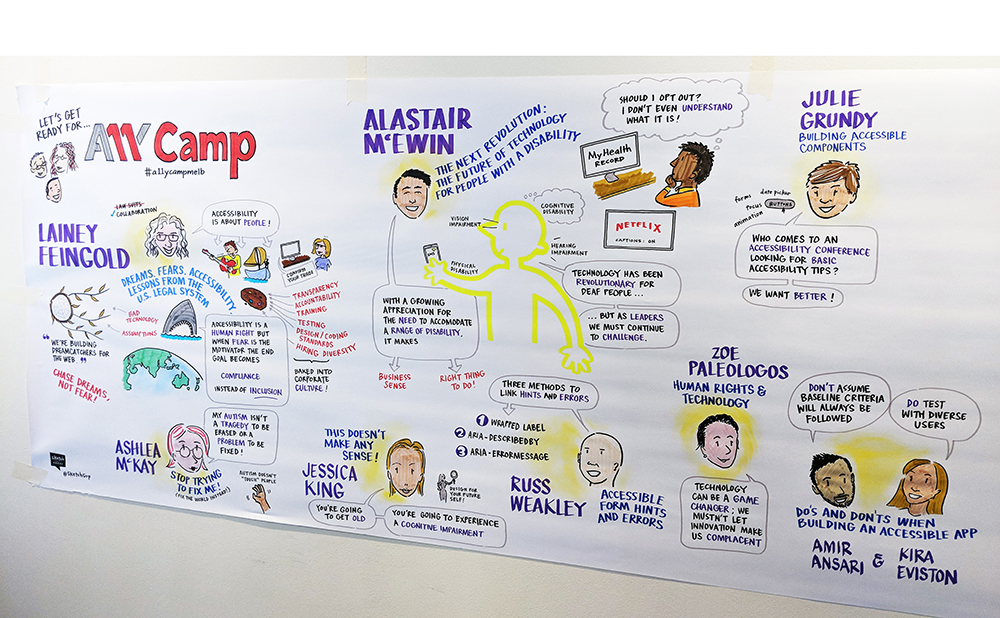On Thursday 18 October, members of the web accessibility community, including web developers, consultants, academics and lawyers, came together to share knowledge and inspire each other to make the digital world more accessible for everyone. The conference included talks by keynote speakers, Lainey Feingold and Alastair McEwin, as well as technical presentations by experts in the field.

Best practices for running an accessible event
With this conference, A11y Bytes set a great example of how to run an accessible event. To cater for everyone’s needs, the conference had:
- wide spaces for people with wheelchairs and guide dogs
- multiple screens so that everyone could see the presentation slides
- Auslan interpreters for people with hearing impairments
- links to presentation slides for people to access on their own devices.
Opening up the digital world to everyone
Keynote speakers, Lainey Feingold and Alastair McEwin, started the day by talking about the possibilities and the challenges of making the web accessible for all.
Lainey Feingold has been working in disability rights since 1992. She used the metaphor of the Native American dream catcher, which is used to catch the bad dreams and let the good dreams through. Lainey says that it is up to web developers and content creators to catch the bad technology and the assumptions that people make about who will be using their product.
Alastair McEwin is the Australian Disability Discrimination Commissioner. While he is optimistic about the possibilities of a digital world that includes everyone, he talked about the challenges for advocates of accessibility. Since the Disability Discrimination Act was introduced 25 years ago, most of the progress has been in the built environment, with ramps being a requirement in all new buildings. However, Mr McEwin asked, ‘Where are the ramps of the digital world?’ As web accessibility is invisible to most people, it is less obvious when a website is not accessible.
‘Bake in’ accessibility from the start
Cordelia Dillon’s quote, ‘Accessibility is like a blueberry muffin – you can’t push the berries in there afterward’, has become a popular message for the web accessibility community. The idea that you should think about accessibility from the very start of each project was echoed by Damian Keeghan of Deloitte, who gave a talk on the commercial reality of accessibility.
Damian pointed out that ‘accessibility is just usability that is more inclusive’ and that the earlier you think about accessibility in your project, the more time and money you will save. To make accessibility a part of your projects from the start, Damian said:
- include people with different types of disability in your target audience and think about how they will use your product
- consult with people with disability when you are testing your product
- don’t think about accessibility as an extra job at the end of the project. Trying to retrofit accessibility on an inaccessible product will always be more expensive than making something accessible from the start.
What’s next: current and future technology
A11y Camp also offered a taste of what’s next for accessibility in the digital world.
The event was sponsored by Aira, a new service that allows people with low vision to hold out their smartphone and have a trained, professional agent describe what is in front of them. This app has huge potential to allow people with low vision to live more independently and get support without needing someone physically next to them.
An upcoming development that is generating a lot of discussion is the Global Public Inclusive Infrastructure (GPII). The GPII is currently pilot-testing a program that will automatically personalise user interfaces to better suit people’s needs. For example, icons could automatically be added to a form asking for someone’s name and address.
To find out more about web accessibility and how we can help you, please contact us.
Phone: (03) 9585 2299
Website: www.informationaccessgroup.com


